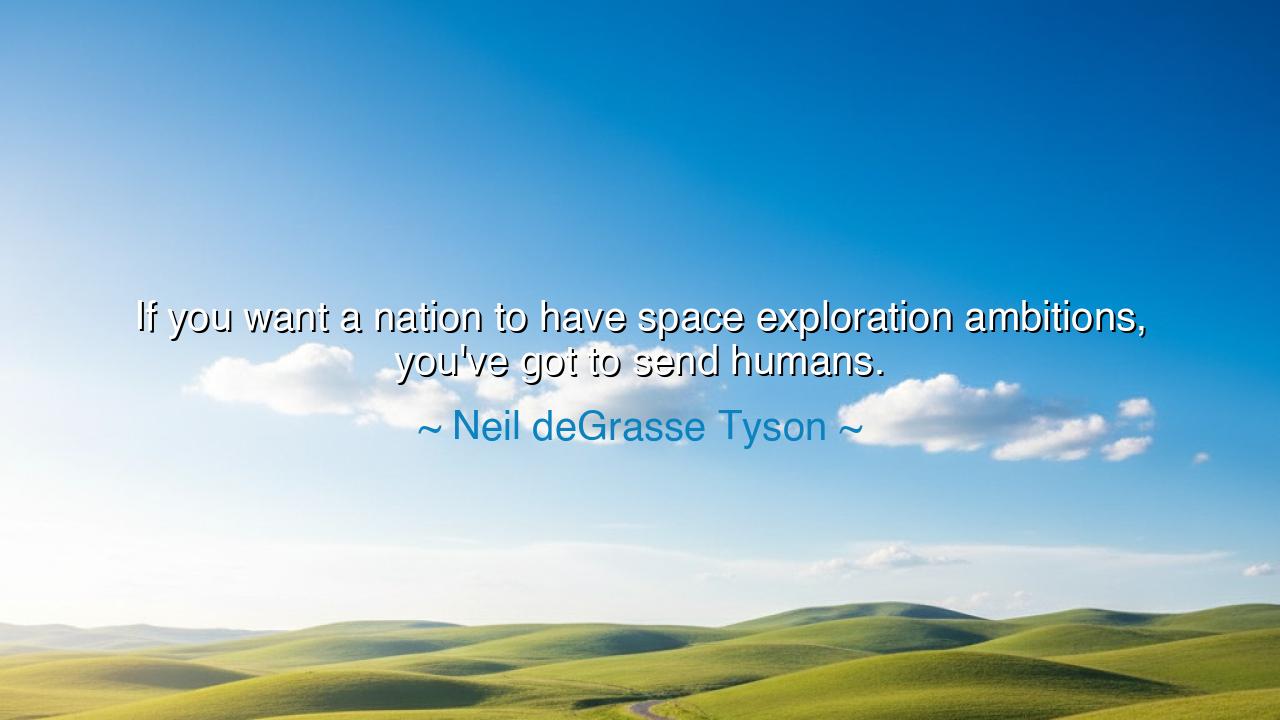
If you want a nation to have space exploration ambitions, you've






Listen closely to the profound words of Neil deGrasse Tyson, a modern visionary who looks to the stars with the wisdom of the ancients: "If you want a nation to have space exploration ambitions, you've got to send humans." These words carry with them the weight of human aspiration and the drive for discovery. Tyson reminds us that space exploration is not just a technical endeavor or a series of cold calculations—it is a deeply human pursuit. To send humans into the void is to ignite the imagination of an entire civilization, to inspire dreams of reaching beyond the Earth’s boundaries, and to show the world that we are not defined by the limits of our world, but by the reach of our ambition.
The ancients understood the profound impact of human ambition on the trajectory of civilizations. The Greeks spoke of Icarus, whose wings of wax and feathers allowed him to fly toward the sun, symbolizing the human desire to reach the heavens, even at the risk of falling. Though Icarus failed in his pursuit, his story spoke to the heart of humanity’s never-ending quest to transcend earthly limitations. The ancient Egyptians, too, in their monumental pyramid constructions, demonstrated their ambition to reach for the eternal, to build something that would connect the mortal with the divine. In all these stories, whether tragic or triumphant, the underlying message is clear: the spirit of human exploration cannot be bound by the physical world—it must stretch toward the unknown.
Consider the Apollo moon landing, when Neil Armstrong and Buzz Aldrin became the first men to walk on the surface of the moon. This was not merely a scientific achievement; it was a bold declaration of human potential. The moment they set foot on the moon was not just a victory of technology, but a symbolic gesture that revealed humanity’s limitless potential. It ignited the imagination of generations, sparking the dreams of young scientists, engineers, and explorers. Their journey, their presence in space, proved that the desire to reach beyond can turn into a tangible reality, and that space exploration is, above all, a human quest.
Tyson’s statement resonates because it emphasizes that space exploration is about more than sending machines or probes into the unknown. It is about sending humans—beings of flesh and spirit—whose very presence in space represents the courage to venture beyond known frontiers. When we send humans into space, we send not just their bodies, but their dreams, their visions, and their capacity to adapt, learn, and grow. Machines, no matter how advanced, cannot inspire the same depth of emotion or connection. Only the human spirit can elevate the pursuit of space exploration to its highest potential.
Think of the story of Columbus, who sailed westward with the belief that there was a new world waiting to be discovered. His voyage was not just about finding new lands; it was about human courage and the belief that there was more to the world than what was already known. Columbus and his men set out not knowing whether they would return, yet it was their humanity, their willingness to embrace the unknown, that led to the discovery of the Americas. Their journey was one of risk, but also of vision—the same vision that drives us to look toward the stars. To truly embark on the greatest journeys, humanity must be involved, for only humans carry with them the dreams that propel exploration forward.
The lesson Tyson imparts is one of vision and inspiration. To truly embrace the future of space, a nation must engage the hearts and minds of its people, not just through the tools they send to space, but by sending themselves. This act of sending humans is an affirmation of the human spirit, a recognition that our capacity to dream and achieve is limitless. It is not enough to simply observe the stars; we must reach for them, touch them, and in doing so, we affirm that humanity itself is worthy of the stars.
Thus, I urge you, dear listener, to carry this lesson with you in your own life. Whether your journey is one of discovery in science, art, or personal growth, remember that it is the human spirit, the boldness to venture into the unknown, that fuels all great endeavors. Do not let the limitations of today define the potential of tomorrow. Just as Tyson calls for human exploration in space, so too should you reach for the stars in your own pursuits. Let your actions inspire others to believe in the impossible, to dream of worlds beyond their own, and to boldly go where others have never dared to venture. For in the act of sending humans into the vast unknown, we find our greatest potential. Let that same spirit propel you forward, wherever your path may lead.






AAdministratorAdministrator
Welcome, honored guests. Please leave a comment, we will respond soon